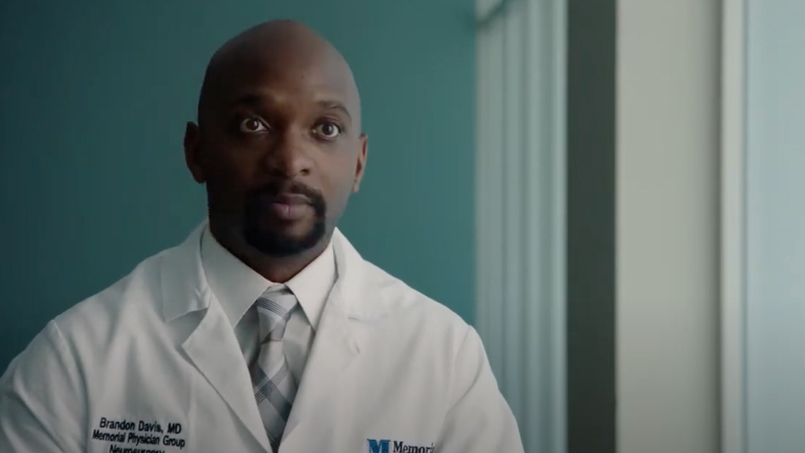
Brain Tumors
We deliver exceptional care for cancerous and non-cancerous brain tumors using the latest treatments.
Specialists in neuroscience treat people with brain tumors using a comprehensive approach, which includes advanced treatments and compassionate support for you and your family.
What Are Brain Tumors?
A brain tumor is a mass of cells that grows in the brain or nearby tissues. There are more than 150 types of brain tumors. They can be aggressive or slow-growing. Some are non-cancerous (benign) and cause few health problems.
Others are cancerous (malignant) and carry a risk of spreading to other areas of the body. These tumors are managed and treated by specialists at Memorial Cancer Institute. We are here to help you find answers and plan a path forward.
Types of Brain Tumors
There are two main categories of brain tumors, primary and metastatic:
- Primary brain tumors start in the brain or surrounding tissues.
- Metastatic brain tumors occur when cancer somewhere else in the body spreads to the brain.
Types of primary brain tumors that occur most frequently in adults include:
- Meningiomas: These are the most common non-cancerous brain tumors, though some can be cancerous. They arise in the membrane that surrounds the brain and spinal cord (meninges).
- Pituitary adenomas: These non-cancerous tumors develop in the pituitary gland, a small gland at the base of the brain behind your eyes.
- Schwannomas: These rare brain tumors are usually non-cancerous. They start in schwannoma cells that protect and insulate nerve cells. Acoustic neuromas are a common type of schwannoma. They affect the nerve that carries signals between your brain and ear (vestibular nerve).
Certain cancers are more likely to travel to the brain, such as:
Some brain tumors, such as acoustic neuromas and pituitary adenomas, occur at the base of the skull and are classified as skull base tumors. Because this region has many blood vessels and nerves, treatment often requires highly specialized care.
How Common Are Brain Tumors?
Metastatic brain tumors are the most common type of brain tumor. Each year in the U.S., the approximate number of people diagnosed with brain tumors includes:
- Metastatic brain tumors: 200,000
- Non-cancerous primary brain tumors: 57,000
- Cancerous primary brain tumors: 25,000
Cancerous primary brain tumors are relatively rare compared with other cancers. They account for approximately one percent of all new cancer cases.
Brain Tumor Symptoms
Brain tumor symptoms depend on the tumor type, location and size. Small tumors may not cause any noticeable symptoms. As a tumor grows, it may press on areas of the brain that control certain functions. If the tumor is fast-growing, symptoms can worsen rapidly.
Common brain tumor symptoms include:
- Headaches
- Changes in personality, behavior and mood
- Loss of balance and difficulty moving
- Nausea and vomiting
- Problems with thought, memory, speech, hearing and vision
- Weakness and numbness in the face or body
- Seizures
Diagnosing Brain Tumors
The first step in diagnosing a brain tumor is to review your symptoms and medical history. Your doctor may also perform a neurological exam to evaluate:
- Involuntary processes, such as breathing and heart rate
- Memory and thinking
- Reflexes, balance and coordination
- Senses, such as vision, smell and hearing
Diagnosis typically involves one or more of the following tests:
- Biopsy: A biopsy is a procedure to remove a tissue sample for laboratory analysis. It’s the only way to determine the tumor type conclusively. Our pathologists can determine whether the cells are abnormal and what kind of cancer is present. During a biopsy, the surgeon may remove as much of the tumor as possible to avoid a second surgery.
- Blood tests: Blood tests detect chemicals in your blood called biomarkers that may indicate cancer.
- Genetic tests: In some cases, your doctor may test the tissue for genetic changes. This information provides a better understanding of the tumor. It also helps determine which cancer treatments may be most effective.
- Imaging tests: CT, MRI and PET scans provide detailed pictures of your brain. They show the size and location of a tumor and help your doctor plan treatment.
- Neurological exam: We ask a series of questions and administer simple tests to check your brain, spinal cord and nerve function. The neuro exam gives us information about your mental status, coordination, senses, reflexes and more.
- Visual field exam: This assesses the total area of your vision. It can help determine whether something is affecting the area of your brain that controls sight.
Treating Brain Tumors
Treatment approaches vary for the different types of brain tumors. Whenever possible, our goal is to remove or destroy the tumor. When that’s not an option, treatment may focus on slowing tumor growth, relieving symptoms and improving quality of life.
For some tumors, a team of neuroscience and cancer specialists manages your care. They work together to plan and deliver brain tumor treatment and monitor your progress.
Your treatment plan may include:
With surgery, we aim to remove as much of the tumor as possible while protecting nearby brain tissue. Our neurosurgeons use advanced techniques, such as awake craniotomy, for tumors near vital brain areas. We also offer minimally invasive pituitary tumor surgery.
Learn more about brain tumor surgery.
In addition to cancer drugs, we may prescribe other medications to control symptoms, such as headaches and seizures.
Radiation therapy targets beams of energy on a tumor to destroy it. It’s typically an option if we can’t remove a brain tumor with surgery. We may also use radiation before surgery to shrink a tumor or after surgery to destroy any cancer cells left behind.
The main types of radiation therapy we use are:
- Intensity-modulated radiation therapy (IMRT): Delivers the radiation beams in the tumor’s precise shape
- Stereotactic radiosurgery (CyberKnife®): Uses image guidance and a robotic platform to deliver the radiation beams
If a brain tumor or its treatment leaves lasting changes in brain function, rehabilitation therapies can help. Memorial Rehabilitation Institute provides nationally recognized care to help you resume daily activities. Explore our neurorehabilitation services.
Medical oncology uses different types of medications to treat cancer, including:
- Chemotherapy
- Immunotherapy
- Targeted therapy
Through Memorial Cancer Institute, you have access to services designed to make your cancer journey easier, including:
Brain Tumors: Why Choose Memorial Neuroscience Institute?
Memorial Healthcare System is home to leading neuroscience and cancer institutes. When you come to us for care, you’ll find:
- Experienced teams: Our fellowship-trained physicians are highly skilled in assessing and treating brain tumors. Your care team may include specialists in neurosurgery, neurointerventional surgery, neurology, neuroradiology, neurocritical care and medical oncology.
- Leading-edge surgical approaches: Our neurosurgeons use the latest techniques and technologies to enhance surgical precision. Advanced approaches include brain mapping, interoperative imaging and minimally invasive procedures.
- Diagnostic expertise: With so many types of brain tumors, getting an accurate diagnosis is essential. We use sophisticated tests to diagnose brain tumors and have extensive expertise in interpreting the results.
- Timely appointments for new diagnoses: We offer same-day appointments for new brain tumor diagnoses so we can establish a treatment plan right away.
- Helpful guidance: Your team includes a designated point of contact to help you navigate the many aspects of care. This person is available to support and guide you and your family before, during and after treatment.
- Personalized care: We take time to understand your goals for treatment, and then design a plan to meet these goals.
- Ongoing monitoring: Some brain tumors require lifelong monitoring or care. Our team is by your side for as long as needed to help you live your healthiest life.









